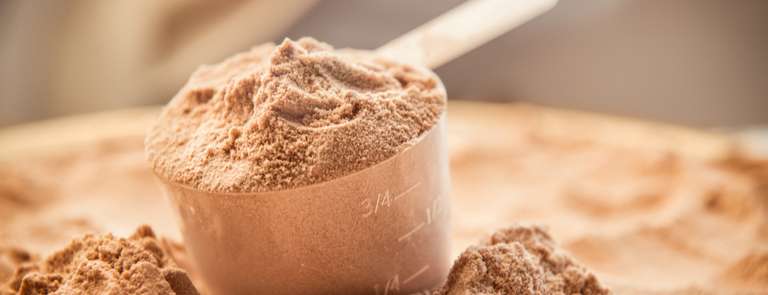
Navigating the world of sports supplements can seem daunting, but if you’ve got clear priorities then it becomes easier to make decisions about what to take, and why.
Here are 16 popular supplements that can help you hit the most common sports goals and improve sports performance.
What are sports supplements?
Supplementation in sport can be quite the contentious subject… but we’re not discussing illegal steroids or any other ‘questionable’ sport supplements that shady guy at the gym might try and sell to you!
Legal sports supplements are products that have the potential to support your body before, during or after workouts. They have been formulated to help:
- Meet nutritional needs, e.g. protein
- Improve nutrient deficiencies
- Fulfil personal fitness goals
- Enhance athletic performance
However, they are not meant to be considered as a replacement to a healthy diet – rather an addition to one.
There are many different types of supplements for sports nutrition, including:
- Vitamins
- Minerals
- Amino acids
- Herbs
- Botanicals
- Food concentrates
- Plant concentrates
The market is saturated with sports nutrition supplements, so it can be difficult to decipher what actually works.
We encourage you to try and pinpoint which areas you would like to improve in, e.g. recovery, energy, muscle growth, etc. as this should make it easier to discover which sport supplements could help you specifically meet your goals.
In this article we will list some of the most popular and effective sports supplements and help you discover which could help you.
Why are sports supplements needed?
Sometimes we may not be getting all we need to perform at our best in our chosen sport or activity from our diet alone.
Other times we may just want a little extra boost for our workout.
Whatever your reason is, there’s a sports supplementation product out there that can help you feel raring to go-go-go, support healthy muscle growth, or help you recover after.
Summary
- Sports supplements include vitamins, minerals, amino acids, herbs, and plant / food concentrates
- They could help to support sports and exercise performance and recovery
- Consider them an addition to a healthy diet, not a replacement for one
| Supplement | Sports topic | What it does |
|---|---|---|
| Creatine | Power |
|
| Fish oils | Flexibility |
|
| Algal oil | Flexibility |
|
| Whey protein | Muscle mass |
|
| Vegan protein | Muscle mass |
|
| BCAAs | Muscle mass |
|
| Mass gainers | Weight gain |
|
| Pre-workouts | Energy |
|
| Energy gels/bars | Energy |
|
| Rhodiola complex | Endurance |
|
| Magnesium | Recovery |
|
| Vitamin D | Recovery |
|
| Vitamin C | Recovery |
|
| Potassium | Recovery |
|
| Sodium | Recovery |
|
| Zinc | Recovery |
|
What are the best supplements for muscle power?
-
Creatine – Increase brain and body power
Trying to get the max out of that last heavy lift? Or want to add another couple of 400m sprints to your session? Consider giving yourself a boost in the form of creatine monohydrate.
Often thought of as being just for bodybuilders and sprinters, creatine is actually a well-researched supplement. It is commonly used by sportsmen and women in all disciplines, both professional and recreational.
Essentially, creatine is a form of fuel, the type used in short, sharp powerful movements. It’s found in foods such as meat and fish, but also produced by your body.18
However, the body only stores a small amount of creatine in the muscles. Taking part in any exercise characterised by repeated short bouts of intense effort, such as resistance training, sprinting, and powerlifting, means creatine stores can become depleted over the course of a workout, leading to a reduction of performance.19
Research shows that supplementing with at least 3g of creatine in pill or powder form every day has positive effects on resistance training and high-intensity intermittent training.
It may also benefit aerobic endurance exercise of over 150 minutes, and even supports normal brain functioning.20
We’d need to eat at least 750g of (raw!) meat and fish to take on board just 2g creatine so a supplement could be the answer, especially if you’re vegetarian or vegan.
Summary
- Creatine is a form of fuel used in short, sharp powerful movements
- It’s found in foods such as meat and fish, but also produced by your body
- The body only stores a small amount of creatine in the body, and these stores can get depleted over time
- Supplementing creatine can help support high-intensity and resistance training
What are the best supplements for joints and flexibility?
-
Fish oils – Maintain and build flexibility, with healthy joints
Our joints take a real knock when we run, jump, play impact sports or simply walk for long periods. They also get stuck when we sit for hours and, if we’re carrying any extra weight, the issue becomes worse whether seated or on the move.
When they’re unhappy, joints (we have more than 300 of them) get stiff, painful and inflamed. If you want to maintain flexibility, staying active and moving your limbs through entire ranges of motion with activities including yoga and swimming is important.
Studies have shown that omega-3 fatty acids, found in oily fish including sardines, herring, mackerel and salmon, have a role in protecting against many conditions, including heart disease.
They also have a positive impact on our joint health by helping reduce inflammation caused by heavy training or other kinds of stress on the body.21,22
Purified omega-3 in the form of pills or liquids (best kept in the fridge) enable us to take more on board, especially if you don’t eat oily fish as part of your diet.
-
Algal oil – a vegan alternative to fish oils
Want the benefit of fish oils detailed above but without the fish? Great news! You can cut out the middle (man) fish and take an algal oil supplement instead.
Fish get their omega-3s from the algae they eat, and algal oil supplements are made from the same marine algae.
Unlike other vegan omega 3 sources, like some nuts, seeds and vegetables, algal oil contains a good balance of DHA and EPA that matches up to traditional fish oils.
One study on 92 healthy adults found that microalgal oil (2.4g / day DHA + EPA) lowered triacylglycerol levels to a degree that was not different from that of a standard fish oil product.23
Another benefit: you definitely won’t be getting any fishy aftertaste!
Summary
- Fish oil – and its vegan equivalent algal oil – contain omega-3s, which can help reduce inflammation of the joints caused by exercise or other stressors
What are the best supplements for muscle gain and strength?
-
Whey protein – Build lean muscle
When people talk about wanting that ‘ripped’ or ‘tight’ look, they are really talking about getting lean.
The common misconception is that this simply involves losing fat, but it’s as much – if not more – about building lean muscle tissue.
Lean muscle also burns more calories at rest than fat, which can improve your metabolism.
Targeted, regular training in the form of bodyweight and barbell-style exercises is the best way to build muscle.
For speedy, noticeable change, we need to eat enough protein as that’s what the body uses to rebuild tiny tears in the muscle fibres caused by exercise.24,25
Up-to-date research suggests that the general guidelines around consuming 0.8g of protein per kg of body weight every day is not sufficient for those with sports goals, and that we should aim for a minimum of 1.4g to 2g.26
Supplementing meals with whey protein is a convenient, affordable way to top up your protein levels.
-
Vegan protein – Build lean muscle (the vegan way!)
Whey is not the only way to enrich your diet with some extra protein.
There are lots of vegan protein powders out there that can do the same job, some of the most popular being pea, hemp and soy protein. All three of these proteins are complete – meaning that they contain all 9 amino acids that our bodies need to repair existing muscle fibres and grow new tissue.
One study comparing the effects of whey protein vs pea protein on physical adaptions following 8-weeks of high-intensity functional training (HIFT) found that there were no significant differences between the two.
Both groups experienced increased strength for 1 rep-max back squats, as well as similar outcomes in body composition, muscle thickness, force production and strength.27
Summary
- Whey and vegan protein powders like pea, soya and hemp help the body to repair muscles after training
-
BCAAs – Muscle maintenance and growth
BCAA stands for branched-chain amino acids. There are three of them:
- Leucine
- Isoleucine
- Valine
Together, they make up 1/3 of all essential amino acids, and are particularly important for building muscle protein. However, there are thought to be some additional benefits to these three amino acid musketeers!
Unlike other essential amino acids, BCAAs are usually sent directly to the muscles for processing, bypassing the liver. This, along with their other properties, means that taking BCAAs could help:28,29
- Increase muscle mass faster
- Provide extra support while you’re exercising
- Help you feel more energised for longer
These are some of the reasons why you will see a lot of protein shakes and pre-workouts contain them. But you can take them by themselves if you want to feel the pure benefit of them or think they could make a nice addition to the supplements you are already accustomed to.
Summary
- BCAAs are amino acids that get directly absorbed into our muscles, rather than having to be processed in the liver
- They can help to increase muscle mass, provide extra exercise support during exercise and support energy levels
-
Mass gainers – Add weight and muscle mass
If your goal is to increase your body and muscle size, you need to make sure you’re consuming more calories than your body needs.
This calorie surplus can be difficult to achieve through diet alone, especially if you have a small appetite – which is why mass gainers were invented.
Mass gainers are usually packed with calories, coming mainly from carbohydrates, protein and a little fat for good measure.
Think of them as a healthier alternative to wolfing down tubs or ice cream or sprinkling cheese over every meal.
Just a few gulps will provide you with hundreds of calories, without all the meal prepping you would need to do if relying on diet alone to help you bulk up.
However, not all mass gainers are created equal. Some are filled with cheap ‘filler’ carbohydrates like sugar, artificial sweeteners and low-quality protein – so always check the label.
Summary
- Mass gainers contain lots of calories from carbohydrates, protein and some fats to help put on weight and muscle
What are the best supplements for energy and endurance?
-
Pre-workouts – Energy for workouts
Do you normally have a coffee or energy drink before you workout? Fancy stepping it up a notch? Specially formulated pre-workout drinks could be the solution.
Pre-workouts usually come in powder form and contain energy-supporting ingredients like caffeine, BCAAs and creatine, as well as fast-acting carbohydrates to provide your body with quick and easy energy to tap in to.
Eating carbohydrates, like a piece of toast or bagel, for example, is a great way to fuel your body, but you have to consider the time it takes for your body to digest them.
Pre-workout powders, on the other hand, provide energy that doesn’t have to be digested in the same way – meaning that you can work out almost straight away after drinking them without that uncomfortable feeling of fullness from food.
A 2014 study published in the Journal of Nutrients found that consuming carbohydrates before an exercise session increased glycogen stores, which are essential for fueling muscles, by approximately 40%.30

-
Energy gels/bars/drinks – Energy during workouts
If you’re an endurance cycling fan, long distance runner or avid hiker, you may need to top up your energy stores during your exercise, as well as before you start off.
For example, when you have been cycling for around an hour, your body will have used up most of its energy stores (glycogen), which can cause you to feel physically and mentally fatigued – and that’s no fun for anyone.
Thankfully, products like energy drinks, bars and gels have been formulated to provide you with fast-absorbing energy to give you that spark back as well as motivation to keep going.
Now, there’s no reason you can’t eat a banana or down a can of sugary fizzy pop to help you keep going; just think of in-sport energy solutions as taking these options one step further.
For example, a lot of energy gels, bars and drinks have excellent formulations that are perfect for your energy needs, like high-quality carbohydrates and electrolytes to help your body stay hydrated.
Summary
- Pre-workout products provide your body with extra energy before you workout
- Energy gels, drinks and bars nourish your body with energy during your workouts, without making you feel full or sluggish
-
Rhodiola complex – Build endurance and stress resilience
If you’re a long-distance runner, cyclist or swimmer, or you’d just like to be able to exercise for longer, then rhodiola rosea could give you the edge.
It’s what’s known as an ‘adaptogen’, which means it helps your body adapt to stress, rather than fight it, by redressing hormonal imbalances. In particular, it helps modulate the build-up of the stress hormone, cortisol.31
One 2010 study suggested that rhodiola rosea can also act as an antioxidant, reducing toxin build-up and muscle tissue damage after an aerobic training session.32
What’s more, this incredible herb has also been linked to brain health and helping to ease the symptoms of mild to moderate depression with great success.33
Summary
- Rhodiola complex could help your body modulate the hormone cortisol, which builds up during exercise
- It also acts as an antioxidant and helps tackle oxidative damage
What are the best supplements for recovery?
-
Magnesium – Recover quicker
Magnesium is used for more than 300 reactions in the body, including the production of energy, the uptake of oxygen, and the balance of electrolytes.
One of its main functions is to help the muscles and nervous system, which gets hyped up by exercise, to switch off.
The more intensely you exercise or do sport, the harder it can be to relax, and very tired muscles can also hurt and twitch at night, disrupting sleep.
We need high-quality deep sleep for our physical, mental and emotional wellbeing, and to help us bounce back from training.
Evidence shows that supplementing magnesium in pill form is helpful in reducing insomnia.34
Magnesium is found in leafy green vegetables and dark chocolate but unfortunately, most of us don’t have as much of this all-important mineral as we need, so supplementation is a good idea.
Vitamins and minerals that can support sport and exercise
-
Vitamin D
Optimal amounts of vitamin D are needed for cardiovascular health, normal immune function, muscle health, and growth and repair.35
-
Vitamin C
Adequate amounts of vitamin C help maintain immune system function and decrease oxidative stress after exercising.36
-
Potassium
Potassium must be replenished after exercise and could help ease muscle cramping.37
-
Sodium
Sodium must be replenished after exercise and could help ease muscle cramping.38
-
Zinc
Zinc has been shown to minimise changes to immune function during athletic training.39
Summary
- There are some vitamins and minerals that help your body perform at its best, including when you exercise
- Magnesium could also help you to sleep better, which is essential for exercise recovery
The final say
- Sports supplements have been formulated to help support your body before, during and after exercising
- These include vitamins, minerals, amino acids, plant extracts, food concentrates, and more
- The benefits vary from product to product, e.g. protein powder can help support muscle recovery, whereas pre-workout products can help give you the energy to workout in the first place
- Results will vary for each individual depending on what exercise they do and how it affects their body



 10% OFF on all products - discounted products are excluded
10% OFF on all products - discounted products are excluded 






